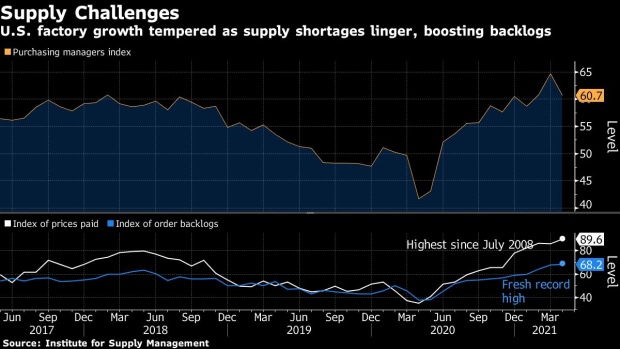May 3, 2021
U.S. factory growth settles back as supply chain snags linger
, Bloomberg News
Biden has over delivered in his first 100 days: Signum Global Advisors' Charles Myers
Growth at U.S. manufacturers cooled in April as ongoing supply chain issues and materials shortages limited production efforts and enlarged backlogs.
A gauge of factory activity fell to 60.7 from a more than 37-year high of 64.7 a month earlier, according to data from the Institute for Supply Management released Monday. Readings above 50 indicate expansion. The report echoes separate figures showing euro-area manufacturers are also battling soaring materials prices and large numbers of unfilled orders.

Persistent supply challenges are restraining otherwise robust momentum in manufacturing output, leading to record backlogs and driving materials prices higher. Factories and their customers have whittled down inventories to meet sturdy demand, the ISM figures showed.
Purchasing managers “reported that their companies and suppliers continue to struggle to meet increasing rates of demand due to coronavirus impacts limiting availability of parts and materials,” Timothy Fiore, chair of the ISM’s manufacturing business survey committee, said in a statement.
“Recent record-long lead times, wide-scale shortages of critical basic materials, rising commodities prices and difficulties in transporting products are continuing to affect all segments of the manufacturing economy,” Fiore said.
All expand
All 18 manufacturing industries reported growth. Among those with the largest expansions in April were electrical equipment and appliances, textiles, furniture and machinery.
ISM’s measure of production softened to a three-month low of 62.5, held back by such capacity constraints. Semiconductor chip shortages have been stifling production at automotive plants.
Meantime, the group’s gauge of prices paid for materials jumped to the highest since July 2008, underscoring shortages of inputs.
A measure of factory stockpiles contracted at the fastest pace since August, while an index of customer inventories dropped to a fresh record low.
Companies in Europe also reported higher costs for materials such as chemicals, metals and plastics and ran down their inventories to cope, according to IHS Markit data issued Monday.
Select ISM industry comments
“In 35 years of purchasing, I’ve never seen everything like these extended lead times and rising prices — from colors, film, corrugate to resins, they’re all up.” - Plastics & Rubber
“The current electronics/semiconductor shortage is having tremendous impacts on lead times and pricing.” - Computer & Electronic Products
“Demand is outpacing supply and will continue into the third quarter, when the supply chain is expected to be refilled.” - Chemical Products
“Continued strong sales; however, we have had to trim some production due to the global chip shortage.” - Transportation Equipment
“Steel prices are crazy high.” - Fabricated Metals
“It’s getting much more difficult to supply production with materials that are made with copper or steel. Lots of work on the floor, but I am worried about getting the materials to support.” - Electrical Equipment & Appliances
The ISM new orders and employment measures also eased to 64.3 and 55.1 respectively. Ahead of the government’s monthly employment report on Friday, economists are projecting the biggest monthly gain in manufacturing payrolls since June. Economists expect overall employment to rise by 980,000.
Other manufacturing surveys highlight the underlying strength of the sector. Most regional Federal Reserve factory surveys improved in April, while IHS Markit’s manufacturing index also advanced from a month earlier.
Looking ahead, a broader reopening of the economy and robust capital investment should support demand. Rebuilding depressed inventories will provide an additional tailwind to the sector.


